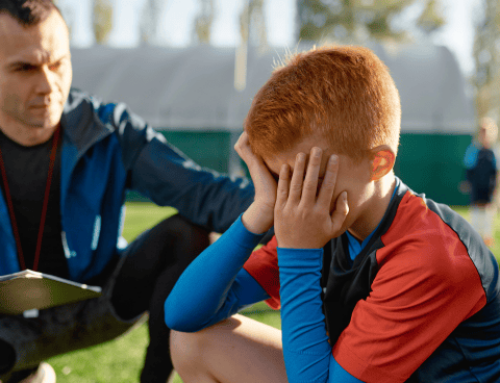5 Ways to Beat Pre-Game Jitters
Most athletes experience “butterflies” or pregame jitters prior to competition or in the opening moments of a game. This is when you feel your heart pounding, your palms sweating and your mind brimming with excitement.
When you interpret such symptoms as anxiety or fear, it makes you feel even more anxious. You don’t want to obsess about how pre-game jitters make you feel. If you focus too much on how nervous you are, you’ll make it worse by losing focus on the current play, point or shot.
Here are five ways to ditch the anxiety:
1. Keep Perspective
The first step is to do a reality check with your own fears. What’s the worst thing that can happen if you get off to a poor start? Your coach might pull you out until you calm down. But no one is going to base their judgment of you as an athlete on how you perform in the early minutes—even if it may feel like that when you’re nervous.
2. Accept Reality
Know that pre-competition nerves are part of sports and that all athletes get them. Interpret them as useful for helping you focus on performing at your peak—giving you a shot of much-needed adrenaline. This is how many successful pros look at jitters.
3. Focus on Prep
Thinking about the uncomfortable feelings only heightens the anxiety. Shift your attention to your game plan and how you want to play the first set, hole or opening minutes of the game. Focus on what you have to do to prepare for the game instead of how juiced up you feel.
4. Think Success
Strive for success instead of worrying about avoiding failure. You cannot win the game in the pre-game warm-up or in the opening minutes. Ask yourself, “What do I need to do to perform my best today?” Think about what you have to do to be successful instead of worrying about how to avoid mistakes or embarrassment.
5. Listen to Tunes
Music can be great for helping you relieve the stress of pre-game anxiety and for giving you the correct mindset. Many athletes use music to get mentally ready for competition. Do you have a favorite song that you find relaxing? Use it! Your key is to find music with the level of intensity that’s best for you.
RECOMMENDED FOR YOU
MOST POPULAR
5 Ways to Beat Pre-Game Jitters
Most athletes experience “butterflies” or pregame jitters prior to competition or in the opening moments of a game. This is when you feel your heart pounding, your palms sweating and your mind brimming with excitement.
When you interpret such symptoms as anxiety or fear, it makes you feel even more anxious. You don’t want to obsess about how pre-game jitters make you feel. If you focus too much on how nervous you are, you’ll make it worse by losing focus on the current play, point or shot.
Here are five ways to ditch the anxiety:
1. Keep Perspective
The first step is to do a reality check with your own fears. What’s the worst thing that can happen if you get off to a poor start? Your coach might pull you out until you calm down. But no one is going to base their judgment of you as an athlete on how you perform in the early minutes—even if it may feel like that when you’re nervous.
2. Accept Reality
Know that pre-competition nerves are part of sports and that all athletes get them. Interpret them as useful for helping you focus on performing at your peak—giving you a shot of much-needed adrenaline. This is how many successful pros look at jitters.
3. Focus on Prep
Thinking about the uncomfortable feelings only heightens the anxiety. Shift your attention to your game plan and how you want to play the first set, hole or opening minutes of the game. Focus on what you have to do to prepare for the game instead of how juiced up you feel.
4. Think Success
Strive for success instead of worrying about avoiding failure. You cannot win the game in the pre-game warm-up or in the opening minutes. Ask yourself, “What do I need to do to perform my best today?” Think about what you have to do to be successful instead of worrying about how to avoid mistakes or embarrassment.
5. Listen to Tunes
Music can be great for helping you relieve the stress of pre-game anxiety and for giving you the correct mindset. Many athletes use music to get mentally ready for competition. Do you have a favorite song that you find relaxing? Use it! Your key is to find music with the level of intensity that’s best for you.











